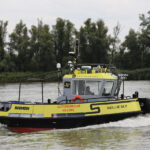Freedom in SA: what freedom?
Freedom in SA: what freedom?
The Economic Freedom of the World: 2021 Annual Report has just been released – and it contains some woeful findings when it comes to South Africa. These findings are relevant to the transport industry and indeed most economic sectors. CHARLEEN CLARKE attended the Free Market Foundation conference to announce these rankings this week.
Economic freedom isn’t necessarily a term that is bandied about often. But it’s vitally important. According to Canada’s Fraser Institute, which produces its own Economic Freedom Index, in order to receive a high rating, a country must provide secure protection of privately owned property, a legal system that treats all equally, even-handed enforcement of contracts, and a stable monetary environment. The country must also keep taxes low, refrain from creating barriers to both domestic and international trade, and rely more fully on markets rather than government spending and regulation to allocate goods and resources.
So how is South Africa doing in this regard? Not too well, unfortunately. South Africa ranks 84th out of 165 countries and territories included in the Economic Freedom of the World: 2021 Annual Report. To put this in perspective, as recently as 2000, South Africa ranked 58th on the list of countries analysed. South Africa has the dubious privilege of sharing the 84th ranking with Nigeria.
An important and revealing factor in South Africa’s decline in the rankings is that it has been overtaken by 15 former communist countries and has seven African countries ahead of it on the economic freedom list. Mauritius is the top-performing African country, clocking in at an impressive 11th.
DIRE CONSEQUENCES FOR SA
One of the potential consequences of a lack of economic freedom is a reduction in foreign investment. And according to Chris Hattingh, deputy director at the Free Market Foundation and the author of the Talking Trade column in FOCUS, that’s exactly what has happened in South Africa. “According to the United Nations Conference on Trade and Development, foreign direct investment flows into South Africa in 2020 almost halved to US$2,5 billion from US$4,6 billion in 2019, which was a 15% decline from around US$5,4 billion in 2018,” he told delegates at the conference.
BEST AND WORST
Hong Kong and Singapore again top the index, continuing their streak in first and second place respectively. New Zealand, Switzerland, Georgia, the United States, Ireland, Lithuania, Australia, and Denmark round out the top 10.
The 10 lowest-rated countries are the Central African Republic, Democratic Republic of Congo, Syria, Republic of Congo, Iran, Zimbabwe, Algeria, Libya, Sudan, and Venezuela. (Despotic countries such as North Korea and Cuba can’t be ranked due to a lack of data.)
Other notable rankings include Japan (18th), Germany (22rd), Italy (47th), France (53rd), Mexico (75th), Russia (100th), India (108th), Brazil (109th) and China (116th).
WHY IS ECONOMIC FREEDOM IMPORTANT?
According to research in top peer-reviewed academic journals, people living in countries with high levels of economic freedom enjoy greater prosperity, more political and civil liberties, and longer lives.
For example, countries in the top quartile of economic freedom had an average per-capita GDP of US$50 619 in 2019, compared to US$5 911 for bottom quartile countries. And poverty rates are lower. In the top quartile, 0,9% of the population experienced extreme poverty (US$1,90 a day) compared to 34,1% in the lowest quartile. Finally, life expectancy is 81,1 years in the top quartile of countries compared to 65,9 years in the bottom quartile.
According to Eustace Davie, a director of the Free Market Foundation, no one in political office who seriously wishes to improve conditions for their fellow citizens can afford to ignore the lessons to be learned from the annually produced Economic Freedom of the World Report. “All they need do is page through the report and see what other countries are doing right or wrong, to establish the best economic policies, which they can then follow to improve the lives of their own citizens.
LESSONS FROM BULGARIA
“For instance, Bulgaria improved its rank on the index from 103rd to 36th between 2000 and 2019. They kept taxes low, reduced inflation from 409,7% to 1,20% per annum, and improved foreign trade conditions. The result was that the average income per capita increased from US$10 201 to US$16 914 during that period.
“By contrast, South Africa has adopted laws and regulations such as minimum wage laws and hiring and firing laws that have caused the country to have one of the highest unemployment rates in the world, with 75% of young people between the ages of 15 and 24 unable to find jobs, according to the International Labour Organization. Applying a good dose of economic freedom to the problem would be the quickest and best way to resolve the matter and allow the unfortunate victims to get jobs,” concludes Davie.
Let’s hope the South African government heeds this advice.
Published by
Focus on Transport
focusmagsa




